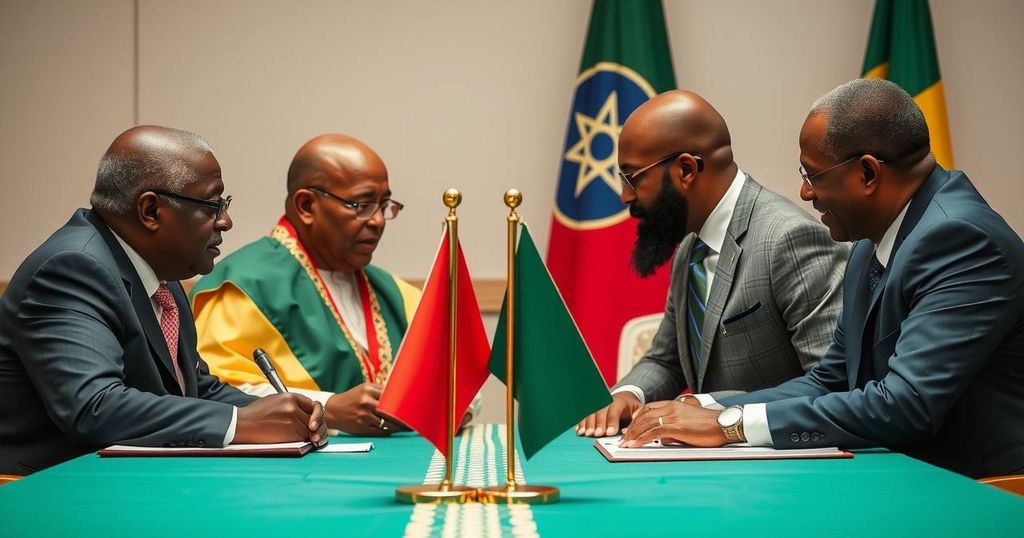Global news
AFRICA, AFRICAN UNION, AFRICAN UNION COMMISSION, ANKARA, ASIA, DIPLOMACY, EAST AFRICA, EUROPE/ASIA, HASSAN SHEIKH, HASSAN SHEIKH MOHAMUD, INDIA, INTERGOVERNMENTAL AUTHORITY ON DEVELOPMENT, INTERNATIONAL RELATIONS, MOHAMUD, MOUSSA FAKI MAHAMAT, REGIONAL COOPERATION, SOMALIA, SOMALILAND, TURKEY, TURKI, TURKIYE, WORK
Fatima Khan
0 Comments
Ethiopia and Somalia Urged to Implement Key Agreement for Regional Stability
The African Union has called upon Ethiopia and Somalia to hasten the implementation of an agreement aimed at resolving tensions regarding Ethiopia’s access to the sea. Following a controversial deal between Ethiopia and Somaliland, Turkish-mediated talks resulted in an agreement promoting cooperation and mutual interests. However, uncertainties remain regarding the status of the prior memorandum with Somaliland amidst heightened geopolitical dynamics in the region.
In an urgent call for action, the African Union has pressed Ethiopia and Somalia to promptly execute a significant agreement aimed at easing tensions between them over Ethiopia’s maritime access. This plea follows a contentious deal reached in January, in which landlocked Ethiopia sought to utilize Somaliland’s coastline for a port and military purposes, prompting Somalia to express concerns regarding its sovereignty. Despite prior disagreements, Ethiopian Prime Minister Abiy Ahmed and Somali President Hassan Sheikh Mohamud recently convened in Ankara, facilitated by Turkish President Recep Tayyip Erdogan, to forge a historic agreement. This accord seeks to navigate bilateral challenges and establish a collaborative approach for both nations, centering on Ethiopia’s secure access to the sea under Somalian authority. With technical discussions slated to commence early next year, the international community, including US Secretary of State Antony Blinken and UN Secretary-General Antonio Guterres, has heralded the agreement as a reaffirmation of each nation’s sovereignty and unity. However, questions remain about the future of the contentious memorandum between Ethiopia and Somaliland, with various stakeholders existing at different stages of dialogue to address the underlying complexities.
The current negotiations between Ethiopia and Somalia are rooted in a complex historical backdrop characterized by territorial disputes and shifting regional alliances. Previously, in January, Ethiopia secured a deal with Somaliland—an independent but unrecognized region of Somalia—to lease coastal territory, raising alarms over potential violations of Somalia’s sovereignty. Ethiopia, landlocked since Eritrea’s independence, has been pursuing greater access to maritime routes as a strategic imperative. Recent escalations have led Somalia to bolster ties with Egypt, reflecting a competitive regional dynamic that complicates the dialogue between the two nations. The involvement of international mediators, such as Turkey, has introduced additional dimensions to these negotiations, highlighting the geopolitical significance of this agreement.
In summary, the African Union’s call for immediate implementation of the agreement between Ethiopia and Somalia heralds a renewed effort toward regional stability and cooperation. This agreement reflects a shared determination to overcome past grievances and build pathways for mutual prosperity, particularly concerning Ethiopia’s aspirations for maritime access. Nevertheless, the complexities surrounding the Somaliland deal necessitate careful navigation to ensure lasting peace and understanding in this volatile region. The involvement of international actors, as well as the emphasis on dialogue, underscores a collective hope for a positive resolution to ongoing disputes.
Original Source: www.arabnews.com




Post Comment